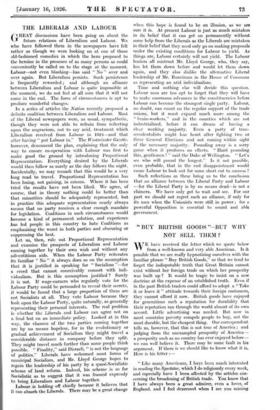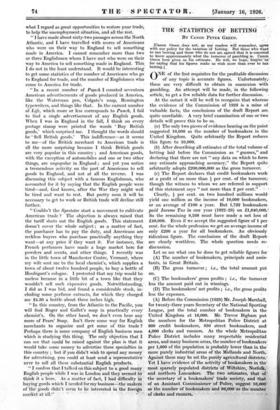" BUY BRITISH GOODS "—BUT WHY NOT SELL THEM ?
WE have received the letter which we quote below from a well-known and very able American. Is it possible that we are really hypnotizing ourselves with the familiar phrase " Buy British Goods," so that we tend to forget the indisputable truth that Great Britain cannot exist without her foreign trade on which her prosperity was built up ? It would be tragic to insist on a new doctrine at the expense of an established truth. Even if in the past British traders could afford to adopt a " Take it or leave it " attitude towards their foreign customers, they cannot afford it now. British goods have enjoyed for generations such a reputation for durability that their reputation ran through the world almost of its own accord. Little advertising was needed. But now in most countries poverty compels people to buy, not the most durable, but the cheapest thing. Our correspondent tells us, however, that this is not true of America ; and judging from the unexampled prosperity of America— a prosperity such as no country has ever enjoyed before— we can well believe it. There may be some fault in his argument. If there is we should like to know what it is. Here is his letter :— " Like many Americans, I have been much interested in reading the Spectator, which I do religiously every week, and especially have I been affected by the articles con- cerning the broadening of British trade. You know that I have always been a great admirer, even a lover, of England. and I feel depressed when I see you missing what I regard as great opportunities to restore your trade, to help the unemployment situation, and all the rest.
" I have made about sixty-two passages across the North Atlantic, and I have travelled with scores of Americans who were on their way to England to sell something made in America. I cannot remember more than two or three Englishmen whom I have met who were on their- way to America to sell something made in England. This; I do not in the least understand. It would be interesting' to get some statistics of the number of Americans who go to England for trade, and the number of Englishmen who come to America for trade.
" In a recent number of Punch I counted seventeen American advertisements of goods produced in America,- like the Waterman pen, Colgate's soap, Remington typewriters, and things like that. In the current number of Life, which more or less corresponds to Punch, I fail to find a single advertisement of any English goods. When I was in England in the fall, I think on every postage stamp were printed the words ' Buy British goods,' which surprised me. I thought the words should be ` Sell British goods.' This indifference—as it semis to me—of the British merchant to American trade is all the more surprising because I think British goods are very popular in this country ; and American goods, with the exception of automobiles and one or two other things, are unpopular in England ; and yet you notice a tremendous activity on the part of Americans to sell goods to England, and not at all the reverse. I was discussing this subject with a famous Englishman, who accounted for it by Saying that the English people were tired—and, God knows, after the War they might well be tired and want to rest. But pretty soon it will be necessary to get to work or British trade will decline still further.
" Couldn't the Spectator start a movement to cultivate American trade ? The objection is always raised that the tariff shuts out the English goods. This statement doesn't cover the whole subject ; as a matter of fact, the purchaser has to pay the duty,. and Americans are reckless buyers who purchase practically anything they want—at any price if they want it. For instance, the French perfumers have made a huge market here for powders and scents, and other things. I recently was in the little town of Manchester Centre, Vermont, where my wife sent me to the local chemist's, which supplies a town of about twelve hundred people, to buy a bottle of Houbigant's cologne. I protested that my trip would' be useless because in a little bit of a town like that -they wouldn't sell such expensive goods. Notwithstanding,' I did- as I was bid, and found a considerable stock, in-' eluding some perfume extracts, for which they charged me $4.30 a bottle about three inches high.
In this country, from the Atlantic to the Pacific, you will find Roger and Gallet's soap in practically every chemist's. On the other hand, we don't even hear any more of Pears' Soap. Isn't there some way for English merchants to organize and get some of this trade ? Perhaps there is 'some company of English business men which is studying this thing. The only objection that I can see that could be raised against the plan is that it would take some money to advertise these specialties in this country; but if you didn't wish to spend any money for advertising, you could at least send a representative oyer to sell .all these substantial English products.
" I confess that I talked on this subject to a good many English people while I Was in London and they seemed to think it a bore. ' As a matter of fact, I had difficulty in buying goods which I needed for thy business—the makers of the' goods 'didn't "seem to be interested in the foreign market al all.' — • -















































 Previous page
Previous page